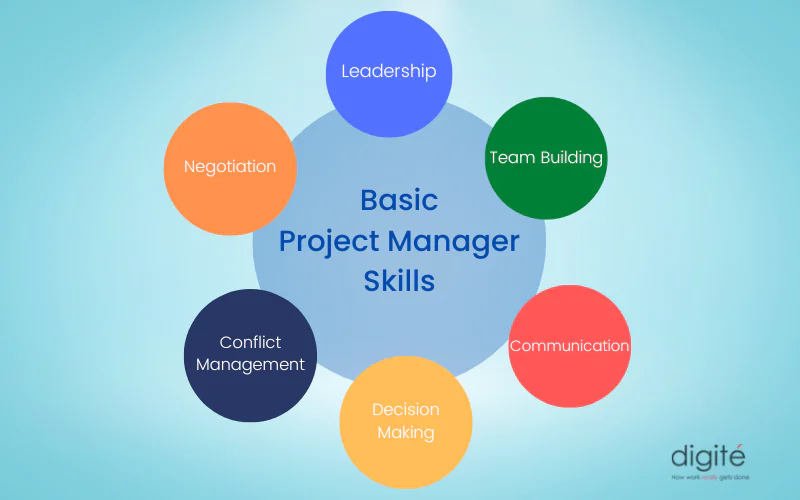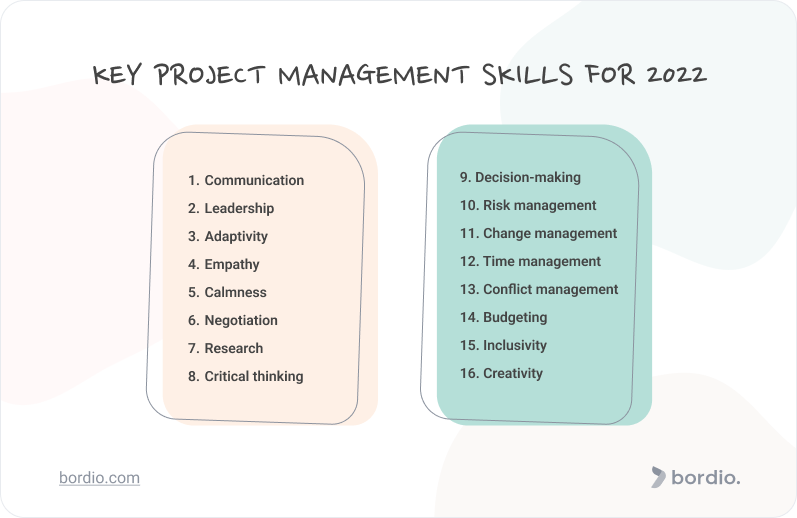Why Do Project Managers Need Leadership Skills?
Project managers need leadership skills because they are responsible for guiding teams and driving the successful completion of projects. With leadership skills, project managers can effectively motivate and inspire team members, delegate tasks, resolve conflicts, and ensure that project goals are achieved on time.
This ability to lead and manage teams is crucial for project managers as it helps them navigate the complexities of project execution and deliver results efficiently. Moreover, strong leadership skills enable project managers to communicate effectively, make informed decisions, and adapt to changes, fostering collaboration and creating a positive work environment.
By possessing these essential leadership abilities, project managers can enhance productivity, boost team morale, and ultimately achieve project success.

Credit: www.nimblework.com
Importance Of Leadership Skills For Project Managers
Effective leadership is a crucial attribute that every project manager should possess. A project manager’s role goes beyond managing budgets, schedules, and resources. They are responsible for leading a team towards the successful completion of a project. Possessing strong leadership skills enables project managers to inspire, motivate, and guide their team members effectively. This blog post will explore the significance of leadership skills for project managers, highlighting the role of effective leadership in project management and the role project managers play as leaders within a project.
Strongeffective Leadership In Project Management/strong
Effective leadership in project management plays a significant role in the overall success of a project. A project manager needs to establish a clear vision and communicate it to the team members. By providing clear direction, the project manager empowers team members to work towards a common goal, fostering collaboration and synergy among team members.
Furthermore, project managers with strong leadership skills are adept at building and nurturing strong relationships with team members and stakeholders. They create an environment that encourages open communication, trust, and transparency. By practicing active listening and providing constructive feedback, project managers can address any concerns and issues promptly, ensuring the project’s smooth progress.
Strongrole Of Project Managers As Leaders/strong
In any project, a project manager assumes the crucial role of a leader. They are responsible for making important decisions, resolving conflicts, and managing risks. Project managers with leadership skills can create a sense of accountability and responsibility among team members, ensuring that everyone is committed to delivering their best work.
Moreover, project managers need to motivate and inspire their team members throughout the project’s duration. By recognizing and celebrating achievements, project managers can boost team morale and motivation. This leads to increased productivity and a positive work environment.
As leaders, project managers also act as a bridge between the project team and stakeholders. They ensure effective communication between both parties, manage expectations, and represent the project’s progress to stakeholders. Project managers with strong leadership skills can build trust and credibility with stakeholders, hence enhancing the overall project success.

Credit: leadershipchamps.wordpress.com
Benefits Of Leadership Skills For Project Managers
Leadership skills are crucial for project managers as they enable them to effectively guide and inspire their teams, improve communication, and make informed decisions. These skills help project managers navigate challenges, build strong relationships, and achieve successful project outcomes with maximum efficiency and effectiveness.
Project managers play a crucial role in the success of any project. While technical expertise and project management knowledge are essential, having strong leadership skills can significantly enhance a project manager’s effectiveness. Leadership skills enable project managers to lead their teams, motivate individuals, and drive project success with improved team performance and increased project success rates.
Improved Team Performance
When project managers possess leadership skills, they are better equipped to inspire and empower their teams. By creating a positive work environment and fostering open communication, project managers can build cohesive and high-performing teams. Good leaders understand the strengths and weaknesses of each team member, and they know how to assign tasks that align with individual capabilities, ultimately optimizing team performance.
Increased Project Success Rates
Leadership skills are instrumental in boosting project success rates. Effective project managers with strong leadership abilities have a better understanding of project goals, objectives, and stakeholder expectations. They can effectively communicate the project vision to the team, ensuring everyone is aligned towards a common goal. With a clear direction and strong leadership, projects are more likely to be completed on time, within budget, and with the desired outcomes.
Key Leadership Skills For Project Managers
Project managers need leadership skills to effectively guide and motivate their team towards successful project completion. These skills, such as communication, decision-making, and delegation, enable project managers to inspire and drive their team members, resulting in improved collaboration, efficiency, and project outcomes.
Project managers play a crucial role in the success of any project. They are responsible for guiding teams, managing resources, and achieving project goals. However, technical expertise alone is not enough to excel in this role. To be effective, project managers must possess strong leadership skills that enable them to motivate, collaborate, and make informed decisions. In this blog post, we will explore three key leadership skills that every project manager should possess: communication and collaboration, decision-making and problem-solving, and motivation and empowerment.Communication And Collaboration
Effective communication and collaboration are essential for project managers to establish clear expectations, convey project requirements, and foster teamwork. By promoting open and transparent communication, project managers can create an environment where team members feel comfortable sharing ideas, seeking feedback, and addressing any challenges that arise. This skill also enables project managers to establish strong relationships with stakeholders, effectively manage conflicts, and facilitate effective decision-making processes.Decision-making And Problem-solving
A project manager’s ability to make sound decisions and solve problems efficiently can significantly impact project outcomes. They must be adept at analyzing information, weighing potential risks and benefits, and selecting the most appropriate course of action. By employing critical thinking and problem-solving techniques, project managers can identify and address issues that may hinder project progress. Additionally, they must be comfortable making decisions in high-pressure situations and embrace accountability for their choices.Motivation And Empowerment
Motivation and empowerment are vital leadership skills that enable project managers to inspire their teams, foster a positive work environment, and drive productivity. By recognizing and appreciating individual and team achievements, project managers can boost morale and enhance job satisfaction. Additionally, they must empower team members by providing them with the necessary resources, support, and autonomy to excel in their roles. Through effective motivation and empowerment, project managers can nurture a culture of innovation, collaboration, and continuous improvement. In conclusion, project managers require a diverse set of leadership skills to effectively navigate the complexities of their role. These skills are critical for establishing strong relationships, promoting effective communication, making informed decisions, and motivating teams towards achieving project success. By continually developing and refining these skills, project managers can position themselves as dynamic leaders capable of driving successful outcomes in any project they undertake.Challenges Faced By Project Managers In Developing Leadership Skills
Project managers often face challenges in developing effective leadership skills, as these skills are vital for success in their role. Leadership skills enable project managers to effectively guide and motivate their teams, handle conflicts, make strategic decisions, and achieve project objectives.
With strong leadership skills, project managers can create a positive work environment and drive project success.
Balancing Technical Expertise And Leadership
One of the biggest challenges faced by project managers in developing leadership skills lies in finding the delicate balance between their technical expertise and their ability to lead and inspire their team. Project managers are often selected for their deep knowledge and proficiency in specific technical areas, which makes them valuable assets to the project. However, this technical expertise can sometimes overshadow the need for strong leadership.
When project managers are focused solely on technical aspects and neglect to develop their leadership skills, it can lead to hierarchical management styles and a lack of empathy towards their team members. This can result in disengagement and a breakdown in communication, making it difficult to effectively manage and motivate the team towards achieving project goals.
On the other hand, if project managers prioritize leadership skills over technical expertise, they may struggle to gain the respect and credibility of their team members. It is essential for project managers to strike a balance between the two, leveraging their technical expertise to guide the team while cultivating leadership qualities that empower and unite their team members.
Dealing With Resistance And Conflict
Another significant challenge that project managers face in developing leadership skills is dealing with resistance and conflict. Leading a project involves working with diverse individuals with varying skills, personalities, and motivations. This inevitably gives rise to conflicts, disagreements, and differing opinions. Effective project managers must possess the ability to navigate these challenges and foster a positive and collaborative work environment.
Resolving conflicts requires exceptional communication and interpersonal skills. Project managers need to be skilled listeners, able to understand their team members’ perspectives and concerns. By actively involving team members in decision-making processes, project managers can encourage collaboration and build trust, thereby mitigating conflicts.
Resistance to change is another common challenge project managers face. When introducing new ideas, processes, or technologies, project managers may encounter pushback from team members who are resistant to change. It is the project manager’s role to address this resistance and guide their team through the change process, ensuring that everyone understands the ultimate benefits and purpose behind the changes being implemented.
In summary, navigating resistance and conflict requires project managers to not only have a deep understanding of their team members but also the ability to communicate and influence effectively. By developing these leadership skills, project managers can foster positive relationships within their team, leading to smoother project execution and ultimately, success.
Strategies For Developing Leadership Skills As A Project Manager
As a project manager, developing strong leadership skills is crucial for not only successfully managing projects but also for guiding and inspiring your team members. Effective leadership allows you to motivate and empower your team, solve problems efficiently, and drive projects towards success. Here are some strategies to help you develop and enhance your leadership skills:
Continuous Learning And Professional Development
Continuous learning and professional development are essential for project managers who want to improve their leadership skills. By staying up-to-date with the latest industry trends, tools, and techniques, you can add value to your projects and lead your team with confidence. Here are a few ways to facilitate continuous learning:
- Attend conferences, seminars, and workshops to gain new insights and network with industry leaders.
- Read books, articles, and blog posts related to project management and leadership.
- Engage in online courses or e-learning programs that offer relevant certifications.
Seeking Mentors And Role Models
Learning from experienced mentors and role models can greatly enhance your leadership skills as a project manager. These individuals can provide guidance, share their experiences, and offer valuable advice. Consider the following actions to seek mentors and role models:
- Connect with seasoned project managers within your organization or industry and request their mentorship.
- Attend networking events and engage in conversations with successful project managers to learn from their experiences.
- Join professional organizations or communities that offer mentorship programs or platforms for connecting with industry experts.

Credit: pm360consulting.ie
Frequently Asked Questions On Why Do Project Managers Need Leadership Skills?
Why Is Leadership Important For Project Managers?
Leadership is crucial for project managers as it allows them to effectively communicate, inspire, and guide their teams towards achieving project goals.
What Are The Benefits Of Project Managers Having Strong Leadership Skills?
Project managers with strong leadership skills can motivate team members, make better decisions, handle conflicts, and ultimately drive project success.
How Can Project Managers Develop Their Leadership Skills?
Project managers can develop their leadership skills by seeking training and mentorship, practicing effective communication, and continuously learning and adapting to new challenges.
Conclusion
Project managers play a crucial role in ensuring the success of a project. Effective leadership skills are essential for project managers as they help in guiding teams, making informed decisions, and fostering a collaborative work environment. By possessing strong leadership qualities, project managers can inspire their team members, drive them towards achieving project goals, and overcome challenges that may arise during the course of the project.
Leadership skills enable project managers to effectively communicate, delegate tasks, and motivate team members, ultimately resulting in successful project outcomes.




